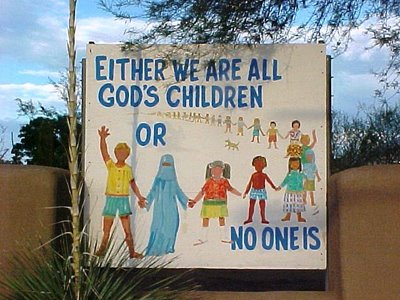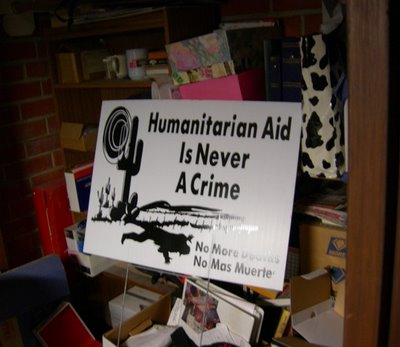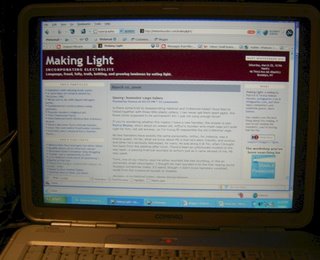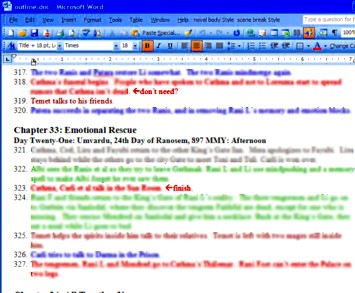
This image has nothing to do with tonight's entry. I just like it. It's the view in my side mirror on my way home from church this afternoon. This shows the first and only major snow on Mount Lemmon this winter, courtesy of yesterday's storm. Down here in the valley, we only got wind and rain.
***
Pat (DesLily) did a follow-up entry today about writers versus "career writers" versus authors, and you know I just can't shut up about a subject I care about it until I've pretty much covered it to death. So here we go again! She seizes on some comments I made about the quality of written work and asks,
I just wonder how one knows it's of a quality likely to attract readers? I think we can all agree that, similar to a movie or a painting, the attractiveness is in the eye of the beholder. So.. just because "I" like it doesn't really mean it is a quality others will be attracted to. So how does one know?I replied in comments:
Yes, it's all subjective, up to a point. Nevertheless, there are minimum standards that any literate person will notice if they are not met. I've read passages by writer wannabes that are chock full of bad grammar, bad punctuation, atrocious spelling (not typos, but the sort where you can tell the person doesn't know what the right spelling is, or that they should have looked it up), wrong words, run-on sentences, and so on. Sometimes you can't even tell what the person meant to say. Their stories often wander and make no sense, with no plot structure to speak of, no conflict and bad continuity. Often they're Mary Sues, in which the impossibly perfect, idealized version of the author saves the day. Yet such people often believe that their every word is golden, and that if no major publisher wants them it must be discrimination, or lack of the right connections. So they pay to have their books published, and call themselves authors.
But if you have a good grasp of such fundamentals, you can probably tell that your work isn't total dreck. The next step is to farm it out to beta readers, people you can trust to say, "This bit doesn't make sense," or "Your dialogue doesn't ring true," or "You need to work in more description," as well as all the positive things. Consider each suggestion carefully, and decide whether changes really need to be made or whether it's a personal taste issue. Polish. If the beta readers say it's great, and problem-free, then you can subject your word-child to the ultimate test: submission somewhere. A rejection doesn't mean it's bad, but a acceptance goes a long way toward validating it as having met professional standards.Pat goes on to tell about a self-anointed "career writer" whose only writing included the unpaid publication of a story she sent to an actor in her teens, followed by years and years of writing in private journals. Pat asks, "Did she really have claim to the title of career writer?"
My reply:
As for your "career writer," this is clearly a case of inflated ego, not a writerly attitude. Career implies making a living as a writer, which this person did not remotely approach doing.Was this person a writer? Certainly. She did a lot of writing. Was the work up to professional standards? Probably not. The story appeared in an unpaid market, probably as fan fiction, I'm guessing. The rest was not subjected to outside scrutiny at all. It may have been good stuff, but it certainly was not professional work, and the person did not make writing her career. She made it her hobby, nothing more. And that's fine, as long as you don't claim a level of professionalism that this person claimed--and did not earn.
Pat writes,
I was never deterred from writing.. but from seeking an agent or publication. Probably because good is not good enough, neither is very good.. only excellence is accepted. (well, ya ain't gonna get it from someone who only got thru high school lol) Add to the fact that at my age I've had my fill of "not being good enough".. so the thought of the rejection letters sits a might uneasy.The idea that "only excellence is accepted" is debatable. How many of us have tried to read a book, only to discover that it's poorly written? I've done that as recently as last week, when I read that
No Frills Book: Science Fiction travesty. The fact that it was meant to be a parody of pulp / space opera cliches did not excuse the book's many shortcomings. It met whatever standard its publisher required, but no one, probably not even the story's author, would claim that the standard it met was one of excellence.
That said, it is true that a writer with no name recognition or track record needs to be at least as good as established writers to get professionally published, if not more so. A well-known name on a book will guarantee more copies sold than an unknown one, so the work needs to have other qualities to compensate. But that doesn't mean you have to outwrite a J. K. Rowling, a Robert Jordan or a Stephen King to get a shot.
On the rejection front, I admitted in comments that I know the emotional toll of this very well:
Yes, rejection letters hurt, especially if you're not thick-skinned about such things - and I'm not. It's hard not to take it personally, but you shouldn't. A rejection slip means simply that on that particular day, the editor or publisher decided not to buy that particular work. Most of the time, you'll never know why this is the case. The budget and publishing schedule may mean that the editor can only buy six titles this year that aren't already contracted for - and yours would be the seventh. Or maybe the editor just bought a book about a pair or royal twins, and doesn't want to publish another one at this time. Or the first reader didn't care for the cover letter and first two pages, and didn't read any further. Or the book's tone is too serious or too silly for the editor's taste. Or the market is currently glutted with poorly-selling books in your particular book's subgenre. Or...well, you get the idea. Maybe the book really wasn't "good enough" by that particular publisher's standards, but that's not the only possible reason for the rejection.
Even if it is the reason, that doesn't necessarily mean that no other publisher would ever want it, or that you can't make the book better before sending it out again, or that you should give up writing for publication. The book has been rejected, by one publisher (or two, or five, or ten). That doesn't mean you personally have been rejected, or that you can never write anything worthwhile. One thing that everyone agrees about is that virtually all professional and semi-professional writers get work rejected.
A Wrinkle in Time, the multi award-winning classic children's book by Madeleine L'Engle, was rejected by virtually every major publisher in existence at that time. It eventually sold because L'Engle met a publisher at a party, who loved the book so much in its uniqueness and challenging material that he bought it, even though he was sure it wouldn't sell. Fortunately for us all, he was wrong about that.
So I, for one, am willing to submit my book to publishers as often if I have to, despite a number of past rejections. I know the book is better than it was when it was rejected before, because I made it better. And if Tor doesn't think it's "good enough," I'll find someone who does. I hope!
Finally, Pat asks,
And if lightening only strikes once? And what is More? Is is writing in journals? Is it writing many letters? What if it's YEARS between writings because... maybe life has to bring the wisdom or the will or whatever it took to come out and write the first time??and I reply:
More writing is more writing - and yes, blogging counts. I'm a better writer now that I was the day I started Musings. And I'm a MUCH better writer than I was the day I started work on the first book. There is no reason to think that you only had one story in you, and it's over, and every reason to think that more experience writing makes one a better writer.Just consider what I've been doing for the last several years. I had the first draft of
Mages 98% done - and then virtually abandoned it for over two years because I went back to school. During that time, my writing was almost entirely confined to formal essays for school, supplemented toward the end by blogging.
Mages languished, but I got pretty good at the essays, which probably contributed to the quality of my online writing. I even learned some things in my schoolwork that I could apply to the prose in my fiction.
 Research material
Research materialBack in the early 1990s, when Teresa Murray and I sold those articles to
Starlog, most of my writing was for fanzines, primarily nonfiction. I eventually got bored with that, until writing about
Quantum Leap became an excruciating chore. So what have I been doing most of today? Writing an article about the music of
Quantum Leap, because I promised that I would. And you know what? It's not too bad - except that I've spent seven hours doing the research for three quarters of a page of prose.
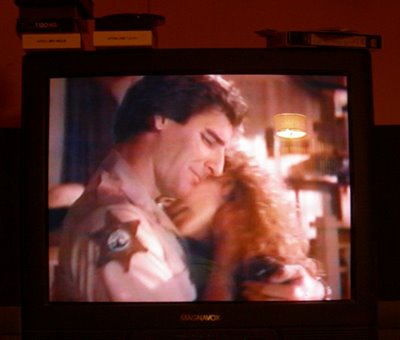 Four or five hours of watching Quantum Leap yielded only three identifiable songs.
Four or five hours of watching Quantum Leap yielded only three identifiable songs. I feel a little guilty that I haven't done as much fiction writing recently as I'd like, but I know that I will get
Mages under control, and I will write the sequel and prequel. I know because I've already written a book, and an incredibly long draft of a second one. There's no reason to think that I can't write more books, and do a slightly better job each time I do so.
What I don't believe for a moment is that someone who wrote one book, or a trilogy, is incapable of writing another one. The only exception would be if the person's one book is an autobiography, or if everything the person ever wanted to say is in that one volume. Even then, chances are excellent that someone who stops after one book has chosen to do so. Whatever ability got the person through the first book is still there - if the person cares to use it.
(Actually, reading Shelly's comment below, I must agree that I overstated this last point a bit. There could be a writer's block issue, emotional problems, physical health problems, and other legitimate reasons why someone stops writing after one book. My point, however, is that by and large, if someone stops after one book, it's because the person already said what he or she wanted to say. It's not because the person's talent or skill suddenly dissippated the moment the first book hit the stores.)
Karen
 Journey of the Sorcerer - The Eagles. This banjo-and-orchestra instrumental has been the theme music for The Hitchhiker's Guide to the Galaxy, ever since the original radio show, all the way through to, well, the radio show. Yes, it was also in the BBC tv series, and there was a version of the song in that mostly awful 2005 film; but 2005 also saw the last series of Hitchhiker's on BBC Radio. That's a more fitting capper to the franchise - and the song - than somebody's cover of the song for the film. It also makes a good intro/warm up to an sf party.
Journey of the Sorcerer - The Eagles. This banjo-and-orchestra instrumental has been the theme music for The Hitchhiker's Guide to the Galaxy, ever since the original radio show, all the way through to, well, the radio show. Yes, it was also in the BBC tv series, and there was a version of the song in that mostly awful 2005 film; but 2005 also saw the last series of Hitchhiker's on BBC Radio. That's a more fitting capper to the franchise - and the song - than somebody's cover of the song for the film. It also makes a good intro/warm up to an sf party. Fate's Wide Wheel - Scott Bakula. If you're a leaper, you probably love this track; otherwise you've probably never heard of it. Written by Velton Ray Bunch, with uncredited lyrics by Chris Ruppenthal, it's from the Quantum Leap episode "Glitter Rock." A more complete version was later recorded for the Quantum Leap soundtrack CD. I once made a music video of the short version, played through twice; but that was several VCRs ago, and the videotape won't play the dubbed music track any more. Scott really doesn't have a heavy metal voice, but he pulls off this power ballad quite well.
Fate's Wide Wheel - Scott Bakula. If you're a leaper, you probably love this track; otherwise you've probably never heard of it. Written by Velton Ray Bunch, with uncredited lyrics by Chris Ruppenthal, it's from the Quantum Leap episode "Glitter Rock." A more complete version was later recorded for the Quantum Leap soundtrack CD. I once made a music video of the short version, played through twice; but that was several VCRs ago, and the videotape won't play the dubbed music track any more. Scott really doesn't have a heavy metal voice, but he pulls off this power ballad quite well.


